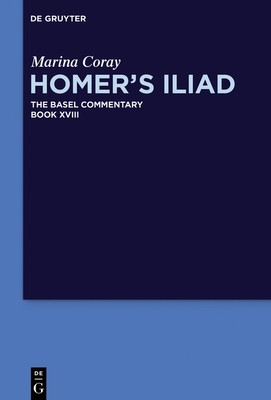
- We will send in 10–14 business days.
- Author: Marina Coray
- Publisher: De Gruyter
- Year: 2018
- ISBN-10: 3110570467
- ISBN-13: 9783110570465
- Format: 15.6 x 23.4 x 2.2 cm, kieti viršeliai
- Language: English
- SAVE -10% with code: EXTRA
Reviews
Description
Since Ameis-Hentze-Cauer (1868-1913) no comprehensive, scholarly commentary of Homer's Iliad has been published in German. In the meantime considerable progress has been made in many traditional areas of Homeric studies (language, realia, structure etc.). In addition, generally acknowledged new fields such as narratology have been systematically studied. Furthermore, the knowledge of the Mycenaean language (Linear B) and oral poetry provide completely new possibilities of textual constitution and analysis. Using the old Ameis-Hentze-Cauer as a starting point, the new commentary reflects the current scholarship on Homer in a comprehensive way. As a new standard work, the "Basel Commentary" of the Iliad has received considerable recognition among scholars worldwide. The fresh concept in terms of content and form serves the needs of different groups of users. The commentary primarily aims at students and academic teachers (at schools and universities), not only of Classics but also of cultural and literary studies as well as of humanities in general.
EXTRA 10 % discount with code: EXTRA
The promotion ends in 23d.18:23:42
The discount code is valid when purchasing from 10 €. Discounts do not stack.
- Author: Marina Coray
- Publisher: De Gruyter
- Year: 2018
- ISBN-10: 3110570467
- ISBN-13: 9783110570465
- Format: 15.6 x 23.4 x 2.2 cm, kieti viršeliai
- Language: English English
Since Ameis-Hentze-Cauer (1868-1913) no comprehensive, scholarly commentary of Homer's Iliad has been published in German. In the meantime considerable progress has been made in many traditional areas of Homeric studies (language, realia, structure etc.). In addition, generally acknowledged new fields such as narratology have been systematically studied. Furthermore, the knowledge of the Mycenaean language (Linear B) and oral poetry provide completely new possibilities of textual constitution and analysis. Using the old Ameis-Hentze-Cauer as a starting point, the new commentary reflects the current scholarship on Homer in a comprehensive way. As a new standard work, the "Basel Commentary" of the Iliad has received considerable recognition among scholars worldwide. The fresh concept in terms of content and form serves the needs of different groups of users. The commentary primarily aims at students and academic teachers (at schools and universities), not only of Classics but also of cultural and literary studies as well as of humanities in general.


Reviews